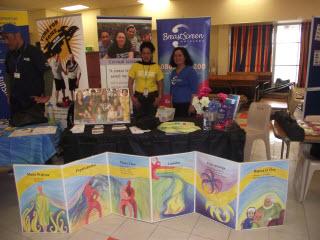- Home
- News
- Screening Matters, Issue 42, October 2013
- Regional Screening Services Wellington spreads the word to new immigrants
News
- Screening Matters Newsletter
- April 2019
- April 2018
- December 2017
- August 2017
- April 2017
- December 2016
- October 2016
- March 2016
- November 2015
- August 2015
- June 2015
- April 2015
- February 2015
- December 2014
- October 2014
- August 2014
- June 2014
- April 2014
- February 2014
- December 2013
- October 2013
- August 2013
- June 2013
- April 2013
- February 2013
Screening Matters
The National Screening Unit newsletter
In this issue:
- Newborn hearing screening ‘best thing for your child’
- Many advantages for private provider in electronic colposcopy reporting
- Regional Screening Services Wellington spreads the word to new immigrants
- NSU and DHBs progressing recommendations from newborn hearing screening programme quality improvement review
- Reminder about timing of bloods for antenatal screening for Down syndrome and other conditions
- Loud shirts all for a good cause
- Electronic colposcopy and the new colposcopy standards update
- Introducing Joyce Brown
- NCSP Register Central Team update
- Updated NCSP policy and standards: providing a laboratory service
- Otago and Southland breast screening services to be provided locally
Regional Screening Services Wellington spreads the word to new immigrants

Both breast and cervical screening were a focus in Wellington, with a well-attended Refugee Communities Safety and Wellbeing Day in Porirua.
More than 100 women visited the breast and cervical screening promotion site to talk with Regional Recruitment & Retention Advisors Palolo Scanlan and Te Rangi Winitana. They were kept busy answering questions and providing women with information translated into a number of different languages. The information was well received and the whole event a great success.
The main immigrant populations in Porirua are from Myanmar (formerly Burma) and Colombia, and many had not heard of breast or cervical screening. Te Rangi has been involved with the organisation of the annual event since it was first held three years ago. More than 20 organisations provided information at the event to help refugees settle in New Zealand, including how to access various health and social services.
Regional Screening Services has also undertaken training with refugee service community workers so they take the key messages of breast and cervical screening into their respective communities in their own languages.
To receive the Screening Matters newsletter by email, fill out our sign-up form.

